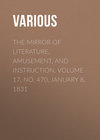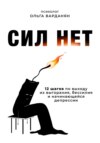Читать книгу: «The Mirror of Literature, Amusement, and Instruction. Volume 17, No. 470, January 8, 1831»
Few places in Britain can boast of higher antiquity than the city of Chichester. Its origin is supposed to date back beyond the invasion of Britain by the Romans. It was destroyed towards the close of the fifth century, by Ella, but rebuilt by his son, Cissa, the second king of the South Saxons, who named it after himself, and made it the royal residence and capital of his dominions.
Chichester, as may be expected, is a fertile field for antiquarian research. Its cathedral, churches, and ecclesiastical buildings abound with fine architecture; and its Cross is entitled to special mention. It is thus minutely described in the Beauties of England and Wales:
The Cross stands in the centre of the city, at the intersection of the four principal streets. According to the inscription upon it, this Cross was built by Edward Story, who was translated to this see from that of Carlisle, in 1475. It was repaired during the reign of Charles II., and at the expense of the Duke of Richmond, in 1746; though we are told that Bishop Story left an estate at Amberley, worth full 25l. per annum, to keep it in constant repair; but a few years afterwards the mayor and corporation sold it, in order to purchase another nearer home. The date of the erection of this structure is not mentioned in the inscription; but, from the style and ornaments, it must be referred to the time of Edward IV. This Cross is universally acknowledged to be one of the most elegant buildings of the kind existing in England. Its form is octangular, having a strong butment at each angle, surmounted with pinnacles. On each of its faces is an entrance through a pointed arch, ornamented with crockets and a finial. Above this, on four of its sides, is a tablet, to commemorate its reparation in the reign of Charles II. Above each tablet is a dial, exhibiting the hour to each of the three principal streets; the fourth being excluded from this advantage by standing at an angle. In the centre is a large circular column, the basement of which forms a seat: into this column is inserted a number of groinings, which, spreading from the centre, form the roof beautifully moulded. The central column appears to continue through the roof, and is supported without by eight flying buttresses, which rest on the several corners of the building. Till a few years since this Cross was used as a market-place; but the increased population of the city requiring a more extensive area for that purpose, a large and convenient market-house was, about the year 1807, erected in the North-street; on the completion of which, it was proposed to take down this Cross, then considered as a nuisance. Fortunately, however, the city was exempted from the reproach of such a proceeding by the public spirit of some of the members of the corporation, who purchased several houses on the north side of the Cross, in order to widen that part of the street, by their demolition.
The Topographer
COUNTY COLLECTIONS
(For the Mirror.)
Kent
He that will not live long,
Let him dwell at Murston, Tenham, or Tong.
Queen Elizabeth's Gun at Dover
"O'er hill and dale I throw my ball,
Breaker my name of mound and wall."
Deal famed much vaunts of new turrets high,
A place well known by Cæsar's victory.
Leland.
Dover, Sandwich, and Winchelsea,
Rumney and Rye the Five Ports be.
Hampshire—Sir Bevis of Southampton
Bevis conquered Ascupart
And after slew the Boar,
And then he crossed beyond the seas
To combat with the Moor.
Westmoreland
I came to Lonsdale where I staid
At hall, into a tavern made,
Neat gates, white walls, nought was sparing,
Pots brimful, no thought of caring.
They eat, drink, laugh, are still mirth making—
Nought they see, that's worth care taking.
Drunken Barnaby's Journal.
Cheshire
Chester of Castria took the name,
As if that Castria were the same.
SHROPSHIRE
"To all friends round the Wrekin."
LINCOLNSHIRE.—STAMFORD
Doctrinæ studium, quod nunc viget ad vada Boum
Tempore venture celebrabitur ad vada Saxi.
Science that now o'er Oxford sheds her ray
Shall bless fair Stamford at some future day.
Merlin.
STAFFORDSHIRE
Or Trent who like some earth-born giant spreads
His thirsty arms along the indented meads.
Milton.
And beauteous Trent that in himself enseams (fattens)
Both thirty sorts of fish and thirty sundry streams.
Spenser.
BERKSHIRE.—ABINGDON
(From Piers Plowman's MSS. 1400.)
And there shall come a king and confess you religious,
And beat you as the Bible telleth, for breaking of your rule,
And then shall the Abbot of Abingdon and all his issue for ever
Have a knock of a king, and incurable the wound.
WILTSHIRE.—SALISBURY CATHEDRAL,
As many days as in one year there be,
So many windows in this church you see,
As many marble pillars here appear
As there are hours throughout the fleeting year,
As many gates as moons one here does view,
Strange tale to tell, yet not more strange than true.
A noble park near Sarum's stately town,
In form a mount's clear top call'd Clarendon;
There twenty groves, and each a mile in space,
With grateful shades, at once protect the place.
Chippenham.—On a Stone
Hither extendeth Maud Heath's Gift,
For where I stand is Chippenham Clift.
GLOUCESTERSHIRE
An owl shall build her nest upon the walls of Gloucester,
And in her nest shall be brought forth an ass.
The Severn sea shall discharge itself through seven mouths,
And the river Usk shall burn seven months.
Merlin.
YORKSHIRE
Robin Hood in Barnesdale stood,
An arrow to head drew he,
"How far I can shoot," quoth he, "by the rood
"My merry men shall see."
SURREY.—ON THE MARKET HOUSE, FARNHAM
You who do like me, give money to end me,
You who dislike me, give as much to mend me.
And Mole that like a nousling mole doth make
His way still underground till Thames he over-take.
Spenser.
The chalky Wey that rolls a milky wave.
Pope.
SOMERSETSHIRE
What ear so empty is, that hath not heard the sound
Of Tannton's fruitful Deane; not matched by any ground.
Drayton.
"Stanton Drew,
One mile from Pensford, and another from Chew."
Bristol Castle
The castle there and noble tower,
Of all the towers of England is held the flower.
Redcliffe Church
Stay curious traveller, and pass not bye,
Until this fetive (elegant) pile astound thine eye,
That shoots aloft into the realms of day,
The Record of the Builder's fame for aie—
The pride of Bristowe and the Western Lande.
Chatterton.
WALES.—GLAMORGANSHIRE
When the hoarse waves of Severn are screaming aloud,
And Penline's lofty castle involv'd in a cloud,
If true, the old proverb, a shower of rain,
Is brooding above, and will soon drench the plain.
PEMBROKESHIRE
Once to Rome thy steps incline.
But visit twice St. David's shrine.
When Percelly weareth a hat,
All Pembrokeshire shall weet of that.
SCOTLAND.—STIRLINGSHIRE—BANNOCKBURN, 1314
"Maidens of England, sore may ye mourn,
For your lemans ye've lost at Bannockburn"
ROXBURGH
"Some of his skill he taught to me,
And, warrior, I could say to thee,
The words that cleft Eildon Hills in three,
And bridled the Tweed with a curb of stone."
Scott.
WESTERN ISLES
Seven years before that awful day,
When time shall be no more,
A watery deluge will o'ersweep
Hibernia's mossy shore.
The green clad Isla too shall sink,
While with the great and good,
Columba's happy isle shall rear
Her towers above the flood.
This prophecy is said to be the reason why so many kings of Scotland, Norway, and Ireland have selected Icombkill for the place of their interment.
DUMBARTON
So cold the waters are of Lomond Lake,
What once were sticks, they hardened stones will make.
PERTH
"Fear not till Birnam Wood
Do come to Dunsinane"
Retrospective Gleanings
GREEK BALLOT.—VOTING AMONG THE ANCIENT GREEKS
The manner of giving their suffrages (says Potter) was by holding up their hands. This was the common method of voting among the citizens in the civil government; but in some cases, particularly when they deprived magistrates of their offices for mal-administration, they gave their votes in private, lest the power and greatness of the persons accused should lay a restraint upon them, and cause them to act contrary to their judgments and inclinations.
The manner of voting privately was by casting pebbles into vessels or urns. Before the use of pebbles, they voted with beans: the beans were of two sorts, black and white. In the Senate of Five Hundred, when all had done speaking, the business designed to be passed into a decree was drawn up in writing by any of the prytanes, or other senators, and repeated openly in the house; after which, leave being given by the epistata, or prytanes, the senators proceeded to vote, which they did privately, by casting beans in a vessel placed there for that purpose. If the number of black beans was found to be the greatest, the proposal was rejected; if white, it was enacted into a decree, then agreed upon in the senate, and afterwards propounded to an assembly of the people, that it might receive from them a farther ratification, without which it could not be passed into a law, nor have any force or obligatory power, after the end of that year, which was the time that the senators, and almost all the other magistrates, laid down their commissions.
In the reign of Cecrops, women were said to have been allowed voices in the popular assembly; where Minerva contending with Neptune which of the two should be declared Protector of Athens, and gaining the women to her party, was reported by their voices, which were more numerous than those of the men, to have obtained the victory.





















